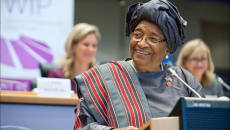One of Liberia’s brightest stars, a 23-year-old musician who was already more accomplished than artists twice his age, met the inevitability of death last week.
Quincy Burrowes, alias Quincy B, was coming home early Friday morning after a performance at a popular karaoke event at Angler’s Bar and Restaurant when the vehicle he was apparently driving crashed into the barricades along the sides of the Pan African Plaza compound.
Alcohol, speed and the lack of safety devices such as seatbelts or airbags were likely factors in the crash and resulting death. Unfortunately, Liberians will likely let Burrowes’ death be in vain instead of using it to spur changes to lower the chances of such incidences happening in the future.
Most Liberians are looking at this as an isolated case instead of identifying the many ways in which our policies can prevent more Quincy B’s from losing their lives.
Ours is a country where vehicles are given the permission to ply the roads without any inspection whatsoever to determine whether they’re safe. Do these vehicles have all their headlights functional, working seatbelts for all seats, tested airbags? No one knows and it appears as if no one cares.
We do the bare minimum to ensure that roadways are safe for driving too. Even on paved roads, it is the exception to see functioning streetlights. As a result, at night, almost all vehicles drive with their high beam lights on, impairing the visibility of other drivers.
Our roads are also constructed without consideration for bicycles or pedestrians, increasing the chances of conflict and accident with automobiles. Moreover, busy intersections in places like Sinkor and Central Monrovia have no stop signs or other indicators of which drivers have the right of way, increasing the potential for conflicts.
And when it comes to behavioral changes that can promote safety, we either do nothing or are selective about our focus. Drunk driving seems to have no legal consequences. Drunk drivers arriving at a police checkpoint at night are more likely to be asked for a drink than required to take a breathalyzer test.
Police only take issues with drivers not wearing seatbelts or driving while talking on the phone when they see an opportunity to extract bribes. It is striking that the message issued by the government, through the Ministry of Information said nothing about any official actions to prevent such incidences in the future.
A press release issued on Friday described the death of the young recording artist as an irreparable loss, not just to his family and many friends, but to the state as well. The statement also offered prayers for the bereaved family and the many admirers of Quincy B to be consoled. There was nothing mentioned about future policy changes to reduce what the World Health Organization estimated was 1,448 traffic deaths in 2013.
Imagine if the former United States President Barack Obama and many other politicians had not proposed anything after the mass school shooting at Sandy Hook Elementary School in the state of Connecticut that killed 20 students and six adults.
He would’ve been ridiculed and accused of making empty statements by members of his party. Instead, he proposed multiple gun laws at the federal level. The shooting renewed debate about gun control. The debates focused on requiring background checks on all firearm sales and on passing new and expanded assault weapon and high-capacity magazine bans.
However, it’s not just our government that is at fault. After all, the demands of the people are supposed to drive the government’s agenda. In the US, Mothers Against Drunk Driving became a force that pushed to stop drunk driving, support those affected by drunk driving, prevent underage drinking, and strive for stricter impaired driving policy, whether that impairment is caused by alcohol or any other drug.
But Liberians are not ready. We’d rather cry over how cruel death is to take this young star away from us instead of taking concrete steps to preventing this from happening again. After all, the death of the former deputy minister of commerce Cyril Allen, Jr., did not spur any change in how we look at safety on roadways. Why should this?
Featured photo courtesy of Paul Cross



